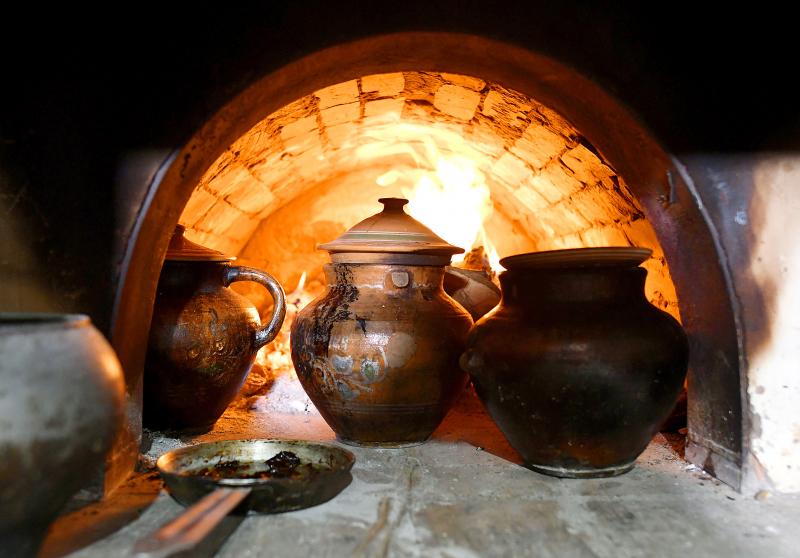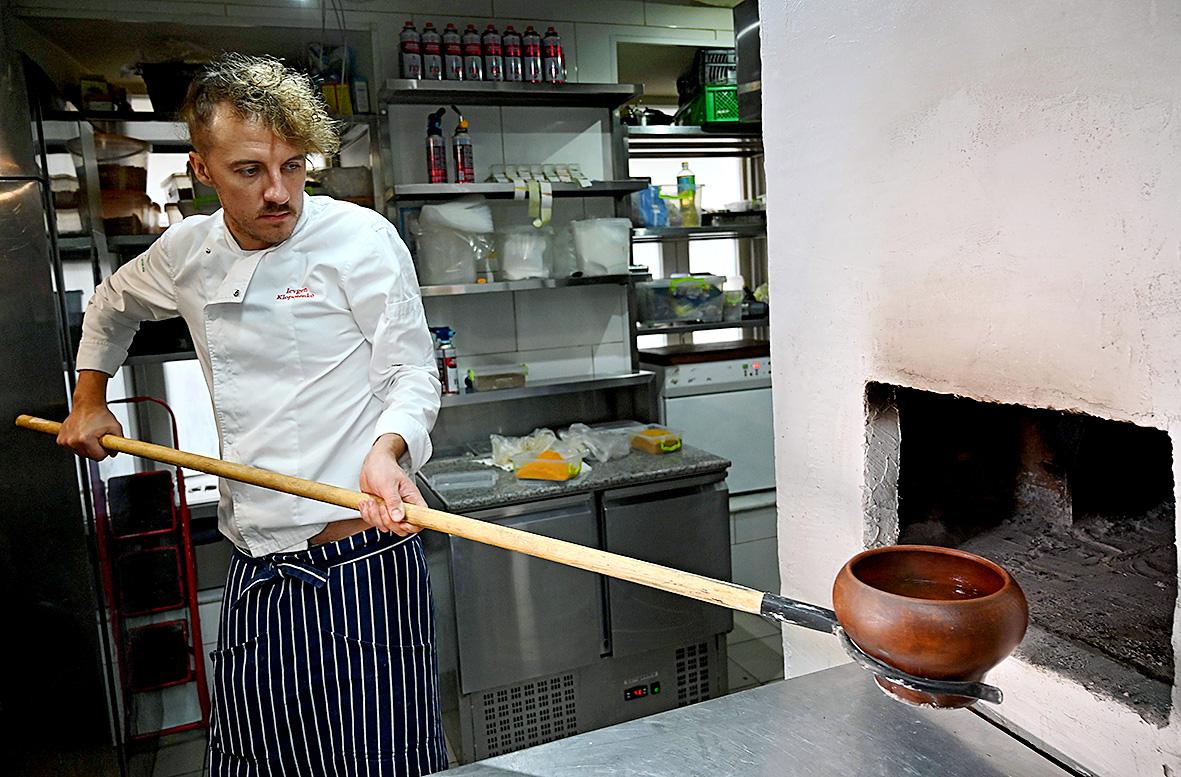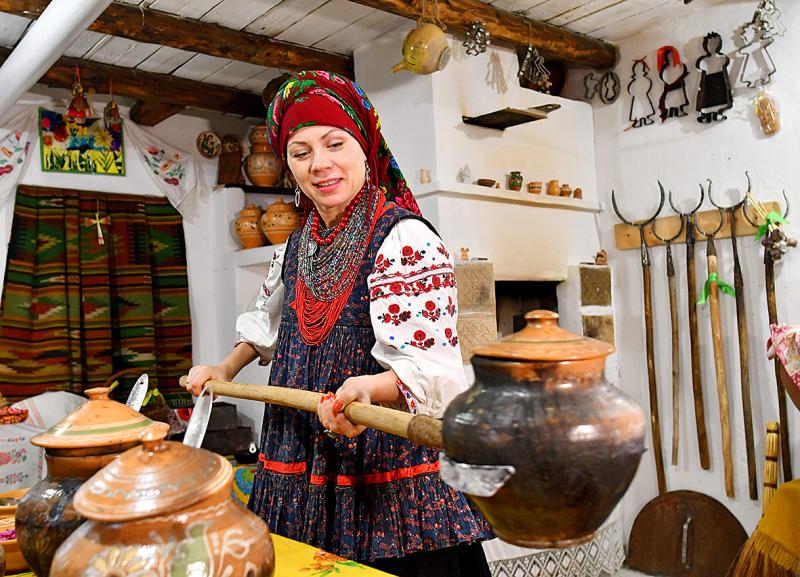Ukrainian chef Ievgen Klopotenko never expected to find himself at the center of the conflict between Russia and Ukraine. But that’s just what happened when the 33-year-old pushed to have borscht — the traditional beetroot and cabbage dish — recognized as part of Ukraine’s historical heritage.
“I don’t really like to call it a war for borscht, but in fact that’s what it is,” Klopotenko, a graduate of the Le Cordon Bleu culinary school, said in his renowned Ukrainian restaurant in central Kiev.
The chef said he was fed up with how restaurants around the world — including those serving “so-called Ukrainian cuisine” — were referring to borscht as Russian soup.

Photo: AFP
So last month he brought a pot of borscht to Ukraine’s culture ministry to convince officials to submit an application to the UN cultural body UNESCO to list borscht as an intangible part of the country’s cultural heritage.
The list already includes French gastronomy, Neapolitan pizza and Georgian wine.
The ministry agreed and said it was preparing the application to UNESCO before the March deadline, so it can be examined in December next year.

Photo: AFP
And suddenly Moscow bristled.
“Borscht is a national food of many countries, including Russia, Belarus, Ukraine, Poland, Romania, Moldova and Lithuania,” Russia’s embassy in the US posted on Twitter.
BORSCHT UNITES US

Photo: AFP
The Russian government soon followed on its own Twitter account, calling borscht “one of Russia’s most famous and beloved dishes and a symbol of traditional cuisine.”
Ukrainians claim that borscht was first mentioned in 1548 in the diary of a European traveler who tasted the soup in a market near Kiev. They say it arrived in Russia much later with Ukrainian settlers.
Tensions between Kiev and Moscow have flared in the decades following the break-up of the Soviet Union in 1991.
After a pro-Western popular uprising in Kiev in 2014 followed by Russia’s annexation of Crimea and support of separatists in the east, the confrontation has intensified.
For Klopotenko, the battle over borscht is really about Ukraine’s identity.
The country has been closely tied to Russia for most of its history. Much of what is now Ukraine was part of the tsarist Russian empire and later the country became part of the Soviet Union. “When I started studying Ukrainian food and cuisine, I realized that Ukrainian cuisine does not exist in Ukraine. It’s all Soviet,” Klopotenko said.
The Soviet Union “swallowed” Ukraine, “chewed it and spat it out ... We don’t know who we are or what we are,” he added.
But there is one thing for Klopotenko that is quintessentially Ukrainian: the beetroot and cabbage soup. “I realized that borscht is what unites us,” he said. “We may be different, we eat different types of borscht cooked to different recipes, but it’s borscht.”
MORE THAN FOOD
The application will not contain a recipe for borscht as “nobody knows the authentic one,” Klopotenko said.
“We will register something bigger. We will register the culture of borscht in Ukraine,” he said, adding that the soup “is much more important than just food.”
Olena Shcherban, a Ukrainian ethnologist and historian, said it is “absurd” to associate borscht with Russia.
“Borscht is the second dish that I ate after my mother’s milk. We wean the baby and then feed him with borscht,” Shcherban said as she stood over her stove cooking the soup.
The 40-year-old says that Ukrainians do not know their history well and have a “lack of pride” in their gastronomy, unlike the French or Italians.
She has tried to promote the dish through a festival in the village of Opishnya in central Ukraine that she has organized for seven years. And last month, she opened a museum dedicated to borscht.
“Borscht is art, borscht is language, borscht is culture, borscht is the history of my Ukraine,” Shcherban said.

A “meta” detective series in which a struggling Asian waiter becomes the unlikely hero of a police procedural-style criminal conspiracy, Interior Chinatown satirizes Hollywood’s stereotypical treatment of minorities — while also nodding to the progress the industry has belatedly made. The new show, out on Disney-owned Hulu next Tuesday, is based on the critically adored novel by US author Charles Yu (游朝凱), who is of Taiwanese descent. Yu’s 2020 bestseller delivered a humorous takedown of racism in US society through the adventures of Willis Wu, a Hollywood extra reduced to playing roles like “Background Oriental Male” but who dreams of one day

Gabriel Gatehouse only got back from Florida a few minutes ago. His wheeled suitcase is still in the hallway of his London home. He was out there covering the US election for Channel 4 News and has had very little sleep, he says, but you’d never guess it from his twinkle-eyed sprightliness. His original plan was to try to get into Donald Trump’s election party at Mar-a-Lago, he tells me as he makes us each an espresso, but his contact told him to forget it; it was full, “and you don’t blag your way in when the guy’s survived two

Nov. 18 to Nov. 24 Led by a headman named Dika, 16 indigenous Siraya from Sinkan Village, in what is today’s Tainan, traveled to Japan and met with the shogun in the summer of 1627. They reportedly offered sovereignty to the emperor. This greatly alarmed the Dutch, who were allies of the village. They had set up headquarters on land purchased from the Sinkan two years earlier and protected the community from aggressive actions by their more powerful rivals from Mattau Village. The Dutch East India Company (VOC) had been embroiled in a bitter trade dispute with Japan, and they believed

Burnt-out love-seekers are shunning dating apps in their millions, but the apps are trying to woo them back with a counter offer: If you don’t want a lover, perhaps you just need a friend? The giants of the industry — Bumble and Match, which owns Tinder — have both created apps catering to friendly meetups, joining countless smaller platforms that have already entered the friend zone. Bumble For Friends launched in July last year and by the third quarter of this year had around 730,000 monthly active users, according to figures from market intelligence firm Sensor Tower. Bumble has also acquired the